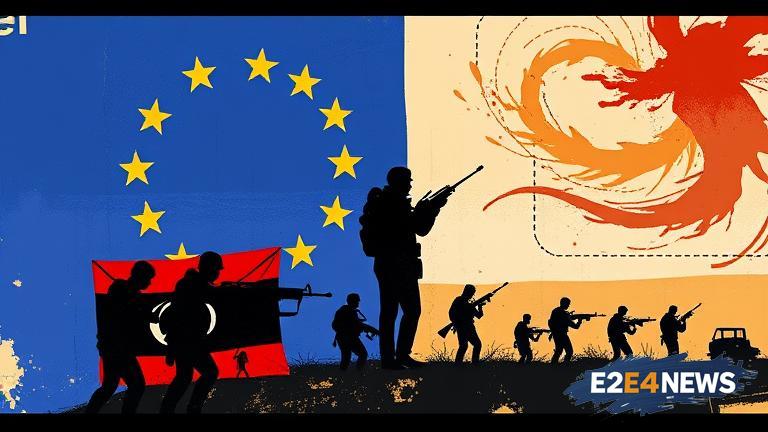The European Union has faced criticism for its handling of the arms embargo in Libya and Darfur, with many accusing the organization of failing to take adequate action to prevent the flow of weapons into the regions. Despite the implementation of an arms embargo, evidence suggests that weapons have continued to pour into Libya and Darfur, fueling violence and human rights abuses. The situation in Libya has been particularly dire, with the country plagued by conflict and instability since the overthrow of Muammar Gaddafi in 2011. The EU’s failure to effectively enforce the arms embargo has been blamed for exacerbating the situation, allowing weapons to fall into the hands of militant groups and fueling further violence. In Darfur, the situation is equally bleak, with the region experiencing ongoing conflict and humanitarian crises. The EU’s inaction has been criticized for allowing the conflict to continue, with many calling for greater action to be taken to protect civilians and prevent further human rights abuses. The EU’s response to the situation has been marred by a lack of transparency and accountability, with many questioning the organization’s commitment to upholding human rights and international law. The situation has been further complicated by the involvement of external actors, including Russia and Turkey, which have been accused of providing military support to various factions in Libya. The EU’s failure to take decisive action has been blamed for creating a power vacuum, allowing these external actors to exert their influence and further destabilize the region. The humanitarian consequences of the conflict have been devastating, with thousands of civilians caught in the crossfire and forced to flee their homes. The EU’s inaction has been criticized for allowing this humanitarian crisis to continue, with many calling for greater action to be taken to protect civilians and provide aid to those affected. The situation in Libya and Darfur is a stark reminder of the need for effective and robust action to be taken to prevent the proliferation of weapons and protect human rights. The EU’s failure to take decisive action has been blamed for creating a culture of impunity, allowing those responsible for human rights abuses to act with impunity. The organization’s response to the situation has been marred by a lack of coordination and cooperation, with many questioning the EU’s ability to effectively address the crisis. The situation has been further complicated by the involvement of various militant groups, including ISIS and Al-Qaeda, which have been accused of exploiting the power vacuum to further their own interests. The EU’s failure to take decisive action has been blamed for allowing these groups to flourish, with many calling for greater action to be taken to prevent the spread of terrorism. The humanitarian consequences of the conflict have been far-reaching, with the situation in Libya and Darfur having a significant impact on regional stability and security. The EU’s inaction has been criticized for allowing the conflict to continue, with many calling for greater action to be taken to protect civilians and prevent further human rights abuses. The situation is a stark reminder of the need for effective and robust action to be taken to prevent the proliferation of weapons and protect human rights. The EU’s failure to take decisive action has been blamed for creating a culture of impunity, allowing those responsible for human rights abuses to act with impunity. The organization’s response to the situation has been marred by a lack of transparency and accountability, with many questioning the EU’s commitment to upholding human rights and international law. The situation in Libya and Darfur is a complex and multifaceted one, requiring a comprehensive and coordinated response from the international community. The EU’s failure to take decisive action has been blamed for exacerbating the situation, allowing weapons to fall into the hands of militant groups and fueling further violence. The humanitarian consequences of the conflict have been devastating, with thousands of civilians caught in the crossfire and forced to flee their homes. The EU’s inaction has been criticized for allowing this humanitarian crisis to continue, with many calling for greater action to be taken to protect civilians and provide aid to those affected. The situation is a stark reminder of the need for effective and robust action to be taken to prevent the proliferation of weapons and protect human rights. The EU’s failure to take decisive action has been blamed for creating a culture of impunity, allowing those responsible for human rights abuses to act with impunity. The organization’s response to the situation has been marred by a lack of coordination and cooperation, with many questioning the EU’s ability to effectively address the crisis. The situation has been further complicated by the involvement of external actors, including Russia and Turkey, which have been accused of providing military support to various factions in Libya. The EU’s failure to take decisive action has been blamed for creating a power vacuum, allowing these external actors to exert their influence and further destabilize the region. The humanitarian consequences of the conflict have been far-reaching, with the situation in Libya and Darfur having a significant impact on regional stability and security. The EU’s inaction has been criticized for allowing the conflict to continue, with many calling for greater action to be taken to protect civilians and prevent further human rights abuses. The situation in Libya and Darfur is a complex and multifaceted one, requiring a comprehensive and coordinated response from the international community. The EU’s failure to take decisive action has been blamed for exacerbating the situation, allowing weapons to fall into the hands of militant groups and fueling further violence. The humanitarian consequences of the conflict have been devastating, with thousands of civilians caught in the crossfire and forced to flee their homes. The EU’s inaction has been criticized for allowing this humanitarian crisis to continue, with many calling for greater action to be taken to protect civilians and provide aid to those affected.




